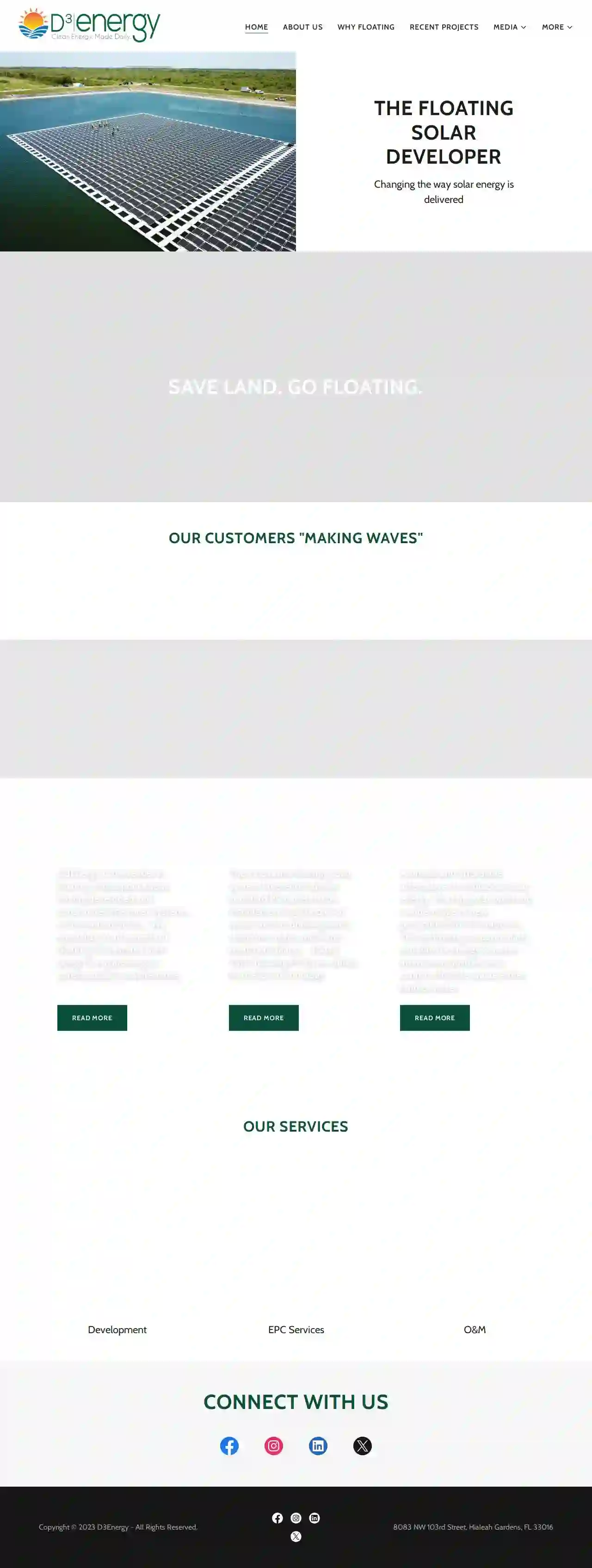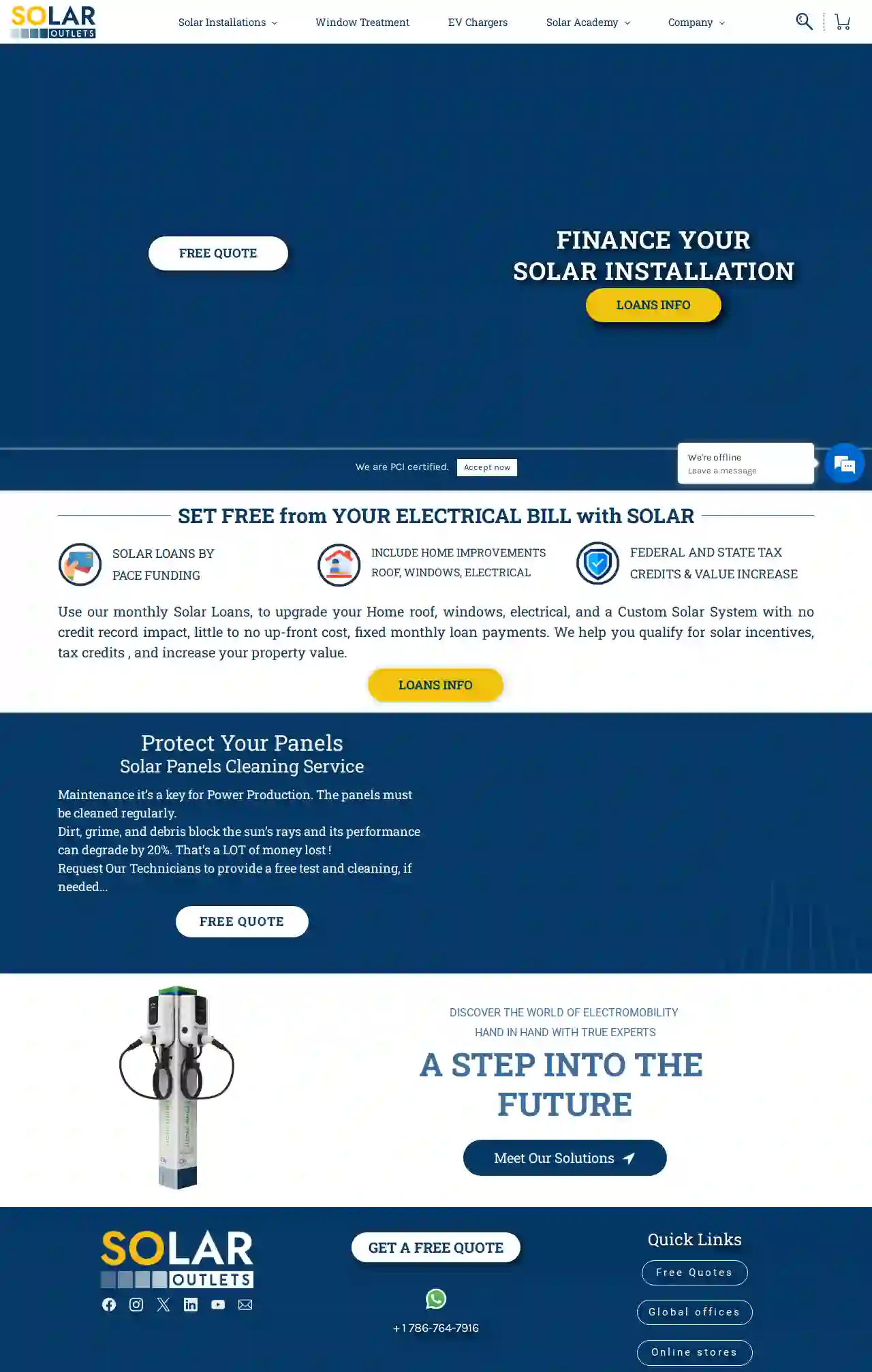Solar Installers Palmetto
Find top Solar Energy Company in Palmetto
Get 3 FREE Solar Contractors quotes for your project today! Compare profiles, reviews, accreditations, portfolio, etc... and choose the best offer.

Solar Air Inc
3.314 reviews3330 SW 13 Avenue, Fort Lauderdale, 33315, USSolar Air Inc. has been providing quality HVAC services in and surrounding areas since 1975. With more than 40 years of experience, we’re certain we can help you find the perfect solution for your heating or cooling problem. If you’re looking for professional repair and installation services in Fort Lauderdale, call Solar Air Inc. at 954-320-7398 today!
- Services
- Why Us?
- Accreditations
- Our Team
- Testimonials
- Gallery
Get Quote
Meraki Solar
52 reviews21 N New Warrington Rd, Pensacola, 32506, USMeraki Solar is a leading solar panel installation company based in Florida, with a focus on educating homeowners about the benefits of solar energy. They offer zero-down options and local incentives to make solar energy more affordable. Their team of solar consultants is dedicated to providing a simplified buying process and ensuring that customers receive all possible benefits.
- Services
- Why Us?
- Accreditations
- Our Team
- Testimonials
- Gallery
Get Quote
Energy Smart Solar
4.122 reviews1234 Solar Way, Suite 101, Miami, 33160, USEnergy Smart Solar is a solar power contractor servicing commercial and residential establishments in South Florida like Broward, West Palm Beach, and Miami Dade County. Our solar power services include installation, repair and maintenance of solar PV systems, solar water heaters, radiant or thermal barriers, solar pool heating, salt chlorination systems and more.
- Services
- Why Us?
- Accreditations
- Gallery
Get Quote
Solis Energy
52 reviewsCasselberry, Florida, 150 N Cypress Way, 32707, USSolis Energy is Power When You Need It. More than just solar! Our reliable outdoor backup power solutions are designed to go above and beyond.
- Services
- Why Us?
- Accreditations
- Our Team
- Testimonials
- Gallery
Get Quote
D3Energy
51 reviewsHialeah Gardens, Florida, 8083 Northwest 103rd Street, 33016, USD3Energy is the leader in floating solar applications, having developed and constructed the most systems in the United States. We specialize in all aspects of floating PV systems from design & engineering to construction & maintenance.
- Services
- Why Us?
- Accreditations
- Our Team
- Testimonials
- Gallery
Get Quote
Optimus Energy Solutions
4.69 reviewsMount Dora, FL, 1107 Robie Avenue, 32757, USOptimus Energy Solutions is a Florida-based company that specializes in providing renewable energy solutions, including residential and commercial solar installations, EV charging systems, and roofer resources. The company aims to make renewable energy accessible to individuals and businesses throughout Florida, Georgia, and the Southeast. With a combined 60+ years of project management, financial management, and construction management experience, the Optimus Energy Solutions team is dedicated to education and providing long-term system operation and investor satisfaction.
- Services
- Why Us?
- Accreditations
- Our Team
- Testimonials
- Gallery
Get Quote
Florida Power Management
4.6115 reviewsWinter Garden, FL, 660 Garden Commerce Pkwy, 34787, USFlorida Power Management is the premier Solar Installer in the Orlando and Tampa area. Our integrity shines as bright as the sun. We are passionate about providing the best solar solutions for every customer and believe that solar energy has a bright future in Florida. Locally owned and operated out of Orlando and Tampa, Florida Power Management has extensive experience permitting, installing, and monitoring solar systems throughout the state, whether you are building a new home or putting solar on an existing house.
- Services
- Why Us?
- Accreditations
- Our Team
- Testimonials
- Gallery
Get Quote
AXIOS SOLAR USA, LLC
Miami, FL, 1234 Solar Street, 33101, USAXIOS SOLAR USA, LLC is known for its authentic commitment in the implementation of alternative energies, especially with the use of SOLAR ENERGY and WIND GENERATION, for the satisfaction of our clients, always focused on our conviction of a better future for all.
- Services
- Why Us?
- Accreditations
- Our Team
- Gallery
Get Quote
Solar Outlets LLC
51 reviewsMiami, USSolar Outlets is a strategic company in the solar market, with business in distribution and integration, project development, business solutions, services and solar education. We offer a full portfolio for solar projects of all scales that includes advisory, procurement, engineering, project development, supply, finance, and construction services. We focuses our objective on build a supply chain to develop solar companies around the world. Offering the best solar components and professional training to success. Our mission is to be at the forefront of the energy revolution. Our mission is to expand the access to the decentralized energy. Bring the benefits of renewable energies to the whole people and make an efficient and healthier planet.
- Services
- Why Us?
- Accreditations
- Our Team
- Gallery
Get Quote
Happy Energy Solar
53 reviews123 Solar Street, Suite 100, Solar City, 12345, USHappy Energy is a boutique solar firm dedicated to providing homeowners with high-quality solar solutions. They offer trusted and licensed installers, top-tier equipment, comprehensive coverages, fast and reliable customer service, and customized solutions for each home. Their mission is to ensure that homeowners are well-informed on their solar choices and to provide fair pricing. Happy Energy helps navigate homeowners to choose the right company that offers the best solar solution for their home.
- Services
- Why Us?
- Accreditations
- Our Team
- Testimonials
- Gallery
Get Quote
Over 4,210+ Solar Companies registered
Our solar experts operate in Palmetto & surroundings!
SolarCompaniesHub has curated and vetted the Best Solar Installers in Palmetto. Find a top & reliable pro today.
Frequently Asked Questions About Solar Installers
- Cash Purchase: The most straightforward option, providing the greatest long-term savings but requiring a larger upfront investment.
- Solar Loans: Loans specifically designed for solar installations, often with favorable terms and interest rates.
- Solar Leases: A third-party company owns the system and leases it to you, allowing you to go solar with little or no upfront cost, but you won't own the system or receive tax benefits.
- Power Purchase Agreements (PPAs): Similar to leases, but you pay for the electricity generated by the system, not the system itself.
- Home Equity Loans or Lines of Credit: Borrow against the equity in your home.
- Use a Directory Like SolarCompaniesHub: We connect you with pre-screened, qualified solar installers in your area.
- Check Online Reviews: Look for positive reviews on Google, Yelp, and other reputable sources.
- Ask for Referrals: Get recommendations from friends, family, or neighbors who have gone solar.
- Verify Credentials: Ensure the installer is licensed, insured, and certified by reputable organizations (e.g., NABCEP in the US).
- Get Multiple Quotes: Compare quotes from at least 3-4 installers to find the best value for your project.
- Ask Questions: Don't hesitate to ask installers about their experience, warranties, and the process they follow.
How can I finance my solar panel installation?
How do I find a good solar installer near me?
What is net metering, and how does it work?
Do I need planning permission to install solar panels in USA?
How can I finance my solar panel installation?
- Cash Purchase: The most straightforward option, providing the greatest long-term savings but requiring a larger upfront investment.
- Solar Loans: Loans specifically designed for solar installations, often with favorable terms and interest rates.
- Solar Leases: A third-party company owns the system and leases it to you, allowing you to go solar with little or no upfront cost, but you won't own the system or receive tax benefits.
- Power Purchase Agreements (PPAs): Similar to leases, but you pay for the electricity generated by the system, not the system itself.
- Home Equity Loans or Lines of Credit: Borrow against the equity in your home.
How do I find a good solar installer near me?
- Use a Directory Like SolarCompaniesHub: We connect you with pre-screened, qualified solar installers in your area.
- Check Online Reviews: Look for positive reviews on Google, Yelp, and other reputable sources.
- Ask for Referrals: Get recommendations from friends, family, or neighbors who have gone solar.
- Verify Credentials: Ensure the installer is licensed, insured, and certified by reputable organizations (e.g., NABCEP in the US).
- Get Multiple Quotes: Compare quotes from at least 3-4 installers to find the best value for your project.
- Ask Questions: Don't hesitate to ask installers about their experience, warranties, and the process they follow.